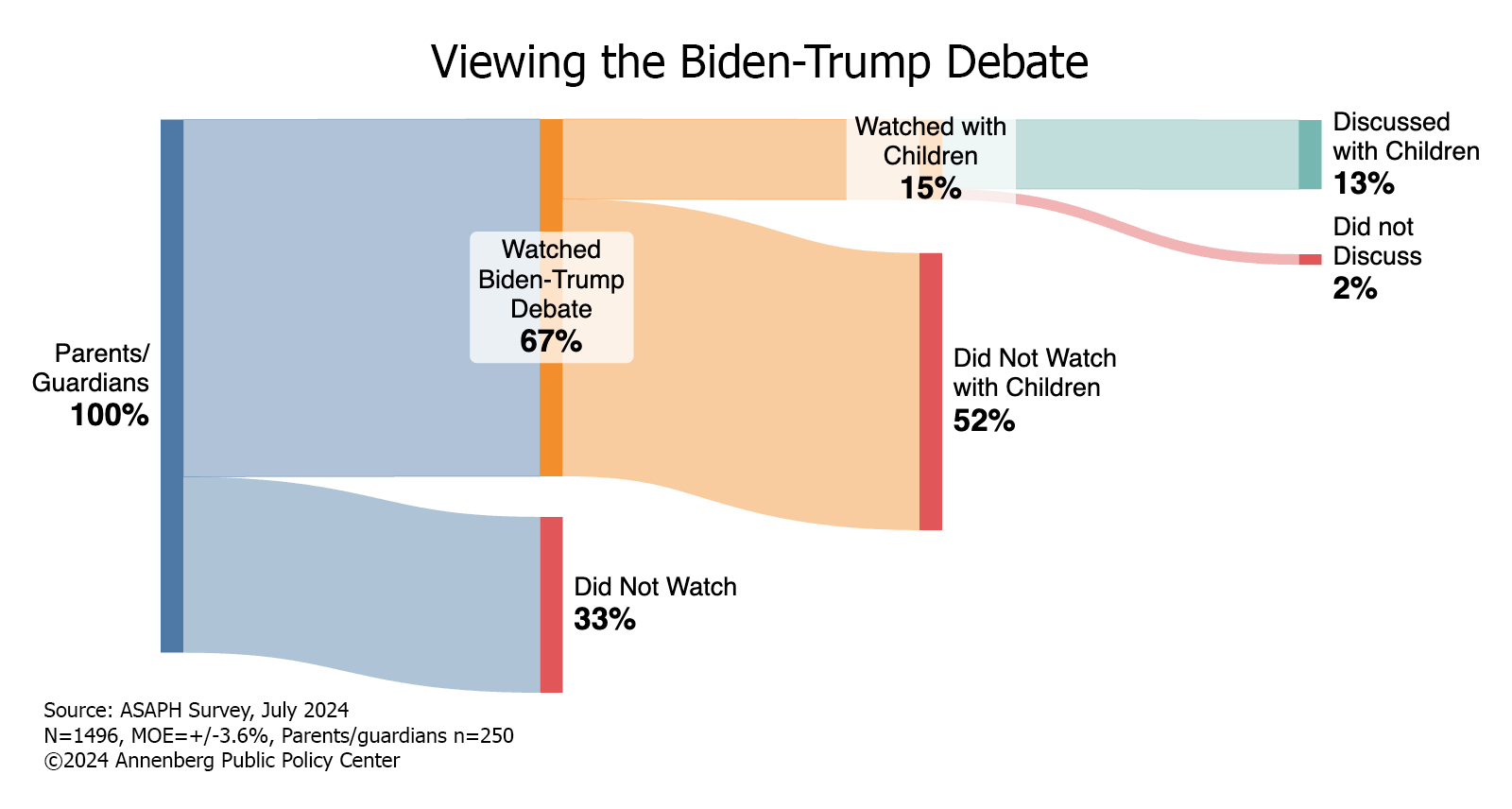General-election presidential debates offer high-profile opportunities for citizens to learn about the candidates’ positions and temperaments, since the matchups draw coverage across diverse media, including broadcast and cable television, newspapers, digital news sites, podcasts, and social media.
Importantly, debates also present valuable opportunities for parents to talk with teens and young adults about the rights and responsibilities of citizenship.
But few parents take advantage of these opportunities, according to a new Annenberg Public Policy Center (APPC) survey of parents and guardians conducted during the 2024 presidential debates – the June debate between President Joe Biden and former President Donald Trump and the September debate between Trump and Vice President Kamala Harris, who succeeded Biden as the Democratic candidate.
Nationally representative APPC panel surveys conducted after the two debates find that while most parents or guardians of teens or young adults watched or listened to at least parts of the debates, less than 1 in 5 did so with a teen or young adult in their household or talked with them about the debate.
The surveys found that only 13% of the parents or guardians maximized the educational opportunities of the Biden-Trump debate by watching and discussing it with their child, and only 19% did so for the Harris-Trump debate.
“It is valuable for parents, teens, and young adults to use presidential debates to have shared media experiences and to then discuss those experiences,” says R. Lance Holbert, director of the Leonore Annenberg Institute for Civics at the Annenberg Public Policy Center. “Debates are teachable moments, and the 2024 presidential debates were missed learning opportunities for most households.”
Today, Holbert notes, a shared newspaper no longer rests on the kitchen table. News is now consumed as much or more often on individual smartphones as on living room TV sets, and parents often do not use the same social media platforms as teens and young adults. “By viewing and discussing debates as a family, parents help shape the ways in which teens and young adults approach political campaigns later in life,” he says.
The Annenberg surveys
Researchers at the University of Pennsylvania’s Annenberg Public Policy Center asked respondents who are part of an ongoing national probability-based panel of U.S. adults how they engaged with both the June 27, 2024, debate between Biden and Trump and the September 10, 2024, debate between Harris and Trump. The first debate survey was conducted July 11-18, 2024, among 1,496 U.S. adults; the second debate survey was conducted Sept. 13-22 and Sept. 26-30, 2024, among 1,744 U.S. adults. Data are weighted to represent the target U.S. adult population. See the end of this news release or the topline for further details.
Specific focus was given to parents or guardians who have teens or young adults between the ages of 13 and 22 living in the same household. There were 250 parents or guardians who met these criteria in the Biden-Trump debate sample, and 301 parents or guardians in the Harris-Trump debate sample.
We asked these parents/guardians if they had watched or listened to all, most, just some, or none of the debate; whether they watched or listened with one of their children in the same room; and whether they discussed the debate with one of their household’s under-22-year-olds during, immediately after, or in the days following the debate.
Findings
How well did the parents or guardians with young people living in their households do in this three-step process? The surveys find that about two-thirds of the parents or guardians watched or listened to at least part of the debates. But there is a steep drop-off among those who do so with a young person in their household, and an even sharper decline among those who discuss the debate with a young person.
In the Biden-Trump debate, we found that of 250 parents-guardians with 13- to 22-year-olds living in the household:
- 67% watched or listened to at least some of the debate.
- 23% of the parents or guardians who watched or listened to at least some of the debate did so with at least one child or young adult present in the room.
- 86% of those parents or guardians who watched or listened to at least some of the debate with a child or young adult present talked about the debate with a child or young adult.
In total, only 13% of parents or guardians maximized the educational opportunities of the Biden-Trump debate.
In the Harris-Trump debate, we found that of 301 parents-guardians with 13- to 22-year-olds living in the household:
- 66% watched or listened to at least some of the debate.
- 30% of those parents or guardians who watched or listened to at least some of the debate did so with at least one child or young adult present in the room.
- 97% of those parents or guardians who watched or listened to at least some of the debate with a child or young adult present talked about the debate with a child or young adult.
In total, only 19% of parents or guardians maximized the educational opportunities of the Harris-Trump debate.

Intergenerational debate viewing
“Our data show that roughly half of all debate viewers consume these media events with others, Holbert says. “However, intergenerational co-viewing is rare. That needs to change. There are clear benefits to consuming presidential debates with others, and this is especially true for parents educating teens and young adults about citizenship.”
Parents who did watch and discuss the debates with their children found them to be rich experiences, Holbert says, with a sizeable majority reporting that their conversations touched on two or more of these candidate-related topics: Civility, qualifications, character, statement accuracy, and issue positions.



Leave a Reply